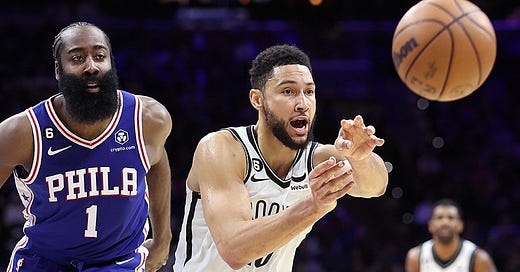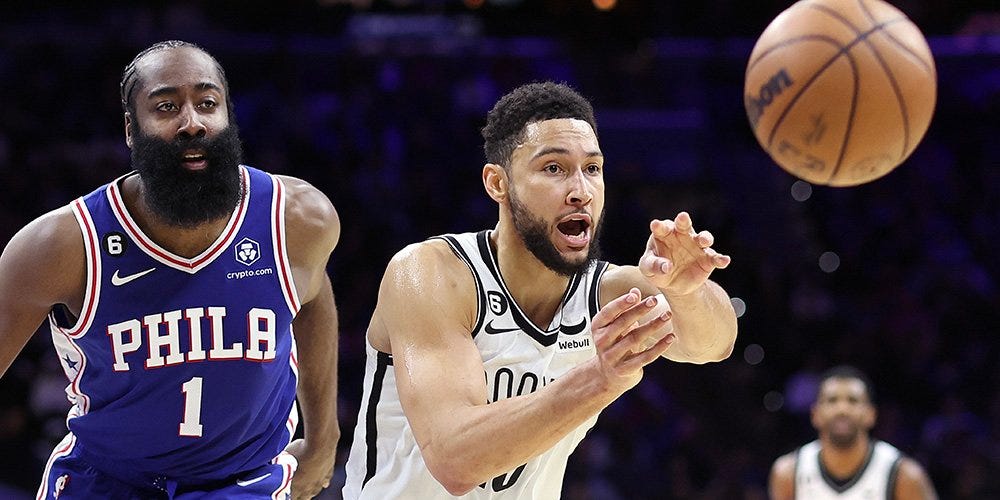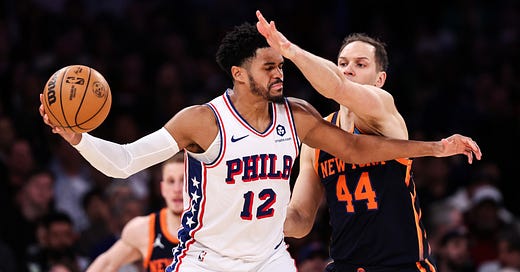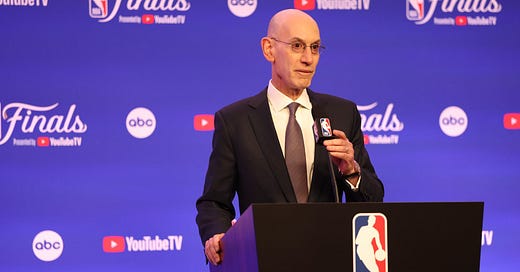
Mike O’Connor is the best O’Connor in basketball writing. Previously of The Athletic, you can find Mike on Twitter @MOConnor_NBA. Mike’s writing is brought to you by Body Bio, supplements based on science, focusing on your gut and brain health. Get 20% off E-Lyte, Gut+, and all Body Bio products with promo code MIKESTUMMY at Body Bio’s website.
In the year and a half since the trade that brought James Harden to the Sixers, it has generally been agreed upon that the trade was a massive victory for the Sixers, and that Daryl Morey’s decision to wait out Ben Simmons’ trade demand for months in hopes of landing a player of Harden’s caliber was a stroke of genius.
As Harden’s time in Philly has played out, though, I’ve come to wonder more and more what life would have been like had Morey and the Sixers taken a different approach to the Simmons saga and pulled the trigger on another trade. The consensus that the trade has been a massive success was built largely on the fact that Simmons’ career has only continued to fall apart since leaving the Sixers, rather than the hypothetical outcomes of other Simmons trades that may have been available at the time. While there is very little certainty about what other offers for Simmons existed and when, we can make some reasonable assumptions about what options the Sixers had and how they would’ve played out.
In this piece, I’ll take a look at several alternative outcomes from that time period, whether or not the Sixers would have been better off had they taken them, and what the Sixers can learn given that they now find themselves in another hostage-type trade demand situation.
The C.J. McCollum trade
The most commonly cited fake trade in the immediate aftermath of the Simmons trade request was a deal sending him to Portland for a package centered around C.J. McCollum. This deal was likely brought up thanks to some legitimate reporting, but also from fans putting two and two together and realizing that this type of trade made sense.
In July of 2021, I said I would do this exact trade:
Blazers get: Ben Simmons, Shake Milton, 2021 second round pick (58th overall)
Sixers get: C.J. McCollum, Robert Covington
I remember getting a lot of pushback from Sixers fans, and the consensus at the time was that if that’s the best deal available, the Sixers should hold onto Simmons heading into the season and wait for a better alternative to come about. Most Sixers fans would have considered this type of trade to be the absolute floor that they would even consider trading Simmons for.
While I’m open to some pushback about how good McCollum ultimately is – I was and am higher on him than most – I do think there are multiple positive trade-offs to pulling the trigger on this trade in the 2021 offseason compared to dealing Simmons for Harden in early 2022.
An entire season of McCollum in 2021-22 – plus Robert Covington – is far more valuable than the 21 games of banged up, out of shape James Harden that the Sixers got that season. One could also make the case that McCollum was a more dependable playoff performer at that point, especially given Harden’s injury status that season.
Additionally, perhaps the most important variable to consider here is that this trade would have allowed the Sixers to keep Seth Curry, Andre Drummond, and both first round picks that they traded away to the Nets in exchange for Harden. The short term depth and long term flexibility that would have come with making a McCollum trade instead of a Harden trade makes it a compelling hypothetical.
The bottom line with a McCollum trade is that it would have given the Sixers a better shot at advancing in the playoffs in 2022, and would have given them a much brighter long-term outlook given the fact that they would have retained two future first round picks. The downside is that they would have inarguably been worse off in 2023, as I would argue Harden’s performance makes the 2023 roster more compelling than any possible outcome after a McCollum trade.
The Minnesota picks package
Another trade that I made the case for at the time was a trade sending Simmons to Minnesota in exchange for role players and a bushel of draft picks – essentially, a deal involving 60-70 percent of what the Timberwolves ended up trading for Rudy Gobert.
Minnesota was often rumored as a motivated suitor for Simmons, and the hypothetical fit next to Karl-Anthony Towns and Anthony Edwards made a lot of sense. Seeing what they ended up trading for Gobert, it’s obvious that the front office was looking to make a splash and that they were willing to overspend.
Let’s say that a Timberwolves trade ended up looking something like this:
Sixers get: Patrick Beverley, Malik Beasley, Jarred Vanderbilt, 2022 first round pick, 2024 first round pick, 2026 first round pick, 2029 pick swap
Timberwolves get: Ben Simmons
In that scenario, the Sixers would be inarguably worse off in 2022, unless they could re-route those assets prior to the trade deadline, but would be far better off in the long run provided that they could find a proper trade partner for those picks.
With all of those Minnesota picks, in addition to retaining their own future firsts, the Sixers could have gotten into any one of the subsequent sweepstakes for a superstar trade – Donovan Mitchell, Kevin Durant, Damian Lillard, etc. all would have come into play over the next couple of seasons.
In this sense, a trade such as this one is similar to a McCollum trade in that it makes your title odds worse off in one of the two Harden years, but raises them in all other years including indefinitely into the future.
Of course, a lot of your perception here depends on how you view Harden and his time here. If you view the 2022 and 2023 Sixers as having had legitimate shots at a title and having simply gotten unlucky, you likely are less intrigued by these alternative trades. If you view the Harden era as having been doomed from the start and that you would have liked to never have gotten into business with him, you’re likely way more sympathetic to these trades.
Personally, I fall much more into the latter camp. Having lived the Harden experience for two years, I would have much preferred to never have entered the Harden business in the first place, and instead have prioritized the long term outlook – it’s objectively incredibly depressing that the team’s long term title window and flexibility is pretty much shot, all because we had to have James Harden. This, of course, is before we even consider the fact that both of these trades were likely available the minute Simmons requested a trade, and we could have saved ourselves the drama of not just one but two hostage situations had they sent Simmons to Portland or Minnesota.
The Haliburton trade
No need to go into too much depth here. There are conflicting reports on whether or not Haliburton was actually available, but if he was, that would have been a vastly better outcome both for the past two years and moving forward. It would have been the best possible outcome out of any of these trades. A Maxey-Haliburton-Embiid core would have made for an incredibly five-plus year run.
The Beal trade
It was rumored by multiple media members, but most notably Bill Simmons, that the Sixers were in discussions with the Wizards around the 2022 trade deadline in a deal that would’ve brought Bradley Beal to Philadelphia.
The advantage of a Beal trade is that he’s more of a low maintenance personality, and likely would not have caused the type of chaos that we now find ourselves in with Harden, but I don’t find myself especially excited about this trade from a basketball standpoint. The Beal trade would have worked out similarly to the Harden trade – he was banged up in 2022, and had a rebound year in 2023, albeit not quite to the level of his prime. The Sixers would have had a puncher’s chance in both seasons, but the long term outlook is somewhat mediocre, and they likely would have had to give Beal the same disgustingly large long term contract that the Wizards did.
The verdict
Over and over again throughout the Simmons saga, Morey expressed his insistence on trading him only for an elite player – once stating that the saga could last four years, and that he was specifically targeting players who are “difference maker(s).”
In short, I do think that Morey limiting his criteria to “difference making” players was ultimately a mistake; it’s a limited framework through which to view a trade, and it resulted in him simply grabbing the only player available who could legitimately be categorized as a “difference maker” rather than the best possible offer with all things considered.
And while Harden’s pedigree puts him in the category of being a difference maker, that fails to consider other possible short and long term outcomes that could have come from other available trades. A Portland trade would have given them a better chance to win in 2022, and would have set them up better for the next 3-5 years. A Minnesota trade would have tanked their chances for 2022, but would have set them up incredibly well for the next 3-5 years. With the Harden trade, we really only got one season of supposed title contention. The rest has been underwhelming and full of drama.
I would also argue that Morey’s obsession with only acquiring a true superstar for Simmons – or, nowadays, for Harden – is an unnecessary mentality that is not validated by recent NBA history. In the past five seasons, the second best players on championship teams have been the following players: Jamal Murray, Andrew Wiggins, Khris Middleton, Anthony Davis, and Kyle Lowry. Aside from Davis, none of those players were top-15 players in the league, and I would argue that Wiggins and Lowry were not even in the top-25.
The past five years have proven that the most important thing for winning a championship is having a top-five player, and the second most important thing is having quality depth, cohesion, and an identity around him. Having a second superstar player is simply not necessary in a post-Heatles, post-Warriors era. And so, having tunnel vision for putting a second superstar next to Embiid is a misevaluation of what it takes to win a title.
For all of these reasons, we can only call the Harden trade a win for the Sixers if it exists in a vacuum. It’s likely that there were better options out there, especially for the long term future. And in the situation we find ourselves in now, one wonders if Morey’s unwillingness to get creative and consider possibilities outside of keeping Harden or trading him for another star will hamper the Sixers’ long term outlook, while yielding no meaningful short term benefit.













